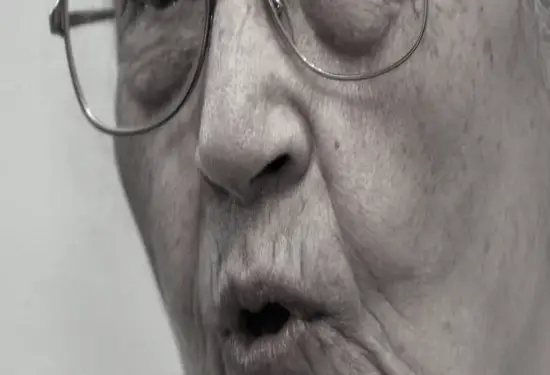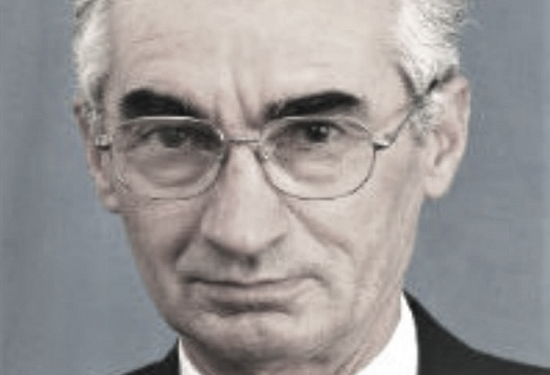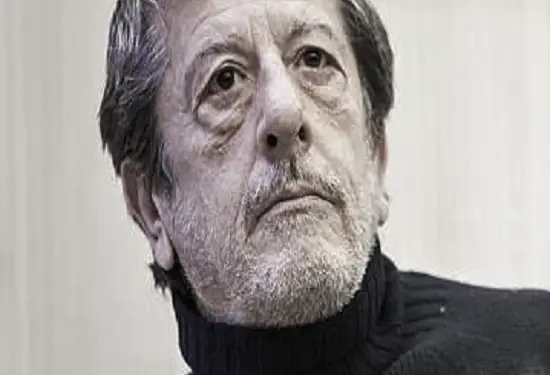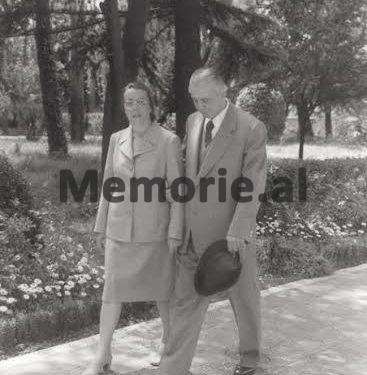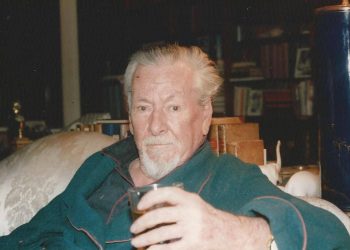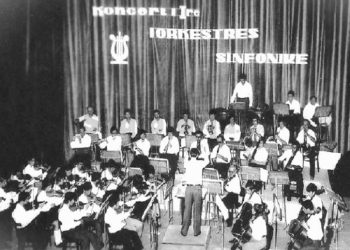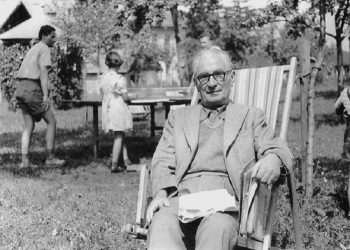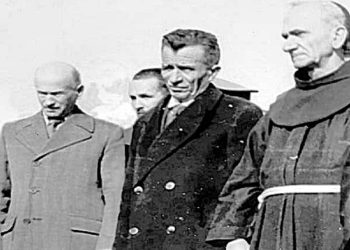By Eugjen Merlika
WORLD OF MRS. HOXHA – (NEXHMIJE IDEA) –
Memorie.al/ In the newspaper ‘Korriere dela Sera’ dated July 30, 2001, on page 12, dedicated to international events, the Italian journalist Andrea Purgatori published an article – interview, with the wife of the former head of the communist regime in Tirana, Enver Hoxha , on the occasion of the eightieth anniversary of her birth.
In large letters, to attract the reader and, perhaps to some extent, to excite him on an exposed nerve, the title of the article was: “There were no skiers in Hoxha’s time.” The article is accompanied by a photograph with the prison gate in the background and a sign reading “Institute of Rehabilitation”. The journalist found this photo or gave it to the interviewee to highlight the fact of her “persecution” by the Albanian post-communist regime, we do not know. The fact is that the title and the photograph, together with the interview as a whole, give the impression of a secret desire to make credible, in the eyes of Italian public opinion, “the last collaborator and wife still alive, of a Marxist-Leninist leader.” .
The article-interview has the merit to reveal to us the thoughts of Mrs. Nexhmije Hoxha today, thoughts that she has certainly thrown in her second book of memoirs. For those of us who have lived for half a century in her “Kingdom”, it is a statement of her loyalty to the ideas that she has embraced since she studied at the “Nana Mbretneshë” Institute, which she has defended and propagated for a lifetime as President of the Institute of Marxist-Leninist Studies. These ideas were implemented in Albania in the second half of the last century by her husband, the leader of the ALP, Enver Hoxha.
The result of the implementation of those ideas was the total destruction of the country, the extreme impoverishment of the people, the lack of more basic freedoms, a regime based on terror, lies and arbitrariness. Was Mrs. Nexhmije, her husband and their caste aware of this reality? Or locked in their tower and surrounded by kissers of all sizes, did they really think they had built the “New World”, in “the only Castle of Socialism in the world”?
Journalist Purgatori, with a slight note of irony, notes that “She was telling a dream of hers, where there is no memory of the six hundred thousand concrete bunkers planted from Greece to Montenegro and the half a million political opponents who ancient Enver, disappeared or re-educated “.
Is the lady really lacking in memory, or was everything normal for her, because that is how it should be, that is how the classics of Marxism taught? Is it possible that, after more than ten years since the fall of the Berlin Wall and, after the apparent unfolding of all the horrors of that catastrophe that was communism, especially in Albania, a ‘Homo sapiens’, still continues to believe in the usefulness of that practical? The journalist emphasizes two indicators, the main ones of the regime’s misgovernance, although he retains the delicacy towards the interviewee and does not mention it.
The bunkers are the most obvious example of the misuse of the wealth of a people and at the same time the most convincing indicator of the stupidity of those who formulated the defense policy in Albania. In economic and financial terms, with the funds spent on them, the entire necessary infrastructure for the country could have been built, and all Albanian families could have been housed in regular housing. Their usefulness for defensive purposes was and remained zero, evidence of the shortsightedness, ignorance and arrogance of a leading caste led by Enver Hoxha with an iron fist.
The class struggle, the unparalleled ferocity of power against political opponents, the violation of their most basic rights and freedoms, the return of the country to a great suffocating prison even for those who were not called such, were other indicators of the criminal policy of regime. Mrs. Hoxha, in her interview, ignores these deep wounds of the socialism she represents, on whose behalf she speaks and for whom she expresses longing. She begins her conversation with an ex catedra sentence that reminds us of her husband’s tone and expressions: “Eight people sitting at a table, not even eight peoples of can decide the fate of the world”! She expresses her admiration for anti-global demonstrators: “They remind me of the sixty-eighth, but these are of a higher level, they are ahead. They will win, because the world is exploding”!
Apparently we are dealing with a person who wanders aimlessly, living with her surreal visions. In fact, we have before us a cold logic, imbued with the idea of hatred, of war, of hope in a turning back, in the resurrection of a world that is no more, but to which Mrs. Nexhmije belongs spiritually, morally and intellectually. Those hundreds of thousands of young people who do not even know what they are looking for, who are instrumentalized and turned into battalions of human backwardness, are for the candle of hope, who make him dream, turn back, remember the time when he waited, followed, financed she taught her few tellars in the Western world. They were completely unknown characters such as: Fosko Dinuçi, Jacques Gripa, Joao Amazonas, Kabilia, etc., respected and abused by the stately building of her husband’s headquarters.
The journalist introduces the interviewee as an ally of Stalin, Mao Zedong and Ho Chi Minh. He speaks of five years of severe imprisonment in Tirana and Tepelena, as “the only woman among an army of murderers.” The lady complains that she slept on the ground. Surprisingly, he found out then that the beds in the Albanian cells of the communist era never existed and that all the detainees slept on the ground, with two blankets in total, for a layer and a cover.
Mrs. Hoxha would do well to make comparisons with the prison standards of her time, before complaining about the conditions of the prison in which she was. It is enough to take the trouble to read the memoirs of those whose regime robbed her of her youth and life, not because they were criminals but because they were the cream of the nation. The “massima sicurezza” prison of Tepelena is a summer place compared to Burrel, Vloçisht, Maliq, Orman-Pojan, Gjirokastra and other camps and prisons where those who slept, vegetated and died died in unimaginable conditions, those who were considered “enemies of the people.”
“In our zero-speed skiers, we lived in a Spartan way.” There is a pronounced dose of cynicism and political accountability in this sentence. The lady knows that she is talking to the messenger of the largest Italian newspaper; she knows that the Italian public opinion is negatively sensitive to the word skiff; I know that there are not a few in Italy who think that the fall of the Berlin Wall has added to their problems Theirs. She seeks to challenge that public opinion, arrogantly asserting two truths at once, with the secret intention of conquering it to legitimize herself. In their time there were no speedboats. It was true, but it is necessary to define things well.
There were no speedboats carrying desperate people from the Albanian coast to Italy hoping for a better life, as exile was called treason and was punished as such by Enver Hoxha’s codes. On the other hand, the illegal trafficking was done by the party-state itself, in various forms and by legal means. An article by the former Albanian ambassador to the United States, Mr. Pëllumb Kulla, published in this newspaper states: “The communist clique of Hoxha and those he left behind has been and remains the most powerful organization of trafficking and smuggling in the entire globe terrestrial. It is impossible for another organization to be put in charge of a state, to have an army, air and navy fleets, all under its feet and its service… “!
We do not know where the proceeds from the smuggling of cigarettes, weapons, drugs went and to what extent the statements of Mr. Kulla correspond to the truth, but certainly Mrs. Hoxha cannot take the pose of the saint against the Italians, after the arrival of most of traffic was their place. As for the Spartan way of life, surely the lady in question refers to her people, since the epithet “Spartan” would lose its meaning if it were given to the lives of members of the communist nomenklatura and even more so those of the ‘Leadership Bloc’. .
With a pronounced note of arrogance, the interviewee throws another glove to the world represented by the journalist, so kind to him: “Everyone had a salary and went on vacation…”! Here is the communist paradise trumpeted so much and so long…! Even after time tore down all the iron curtains and exposed the naked Enverist hell, Mrs. Nexhmije continues to sway in her eternal illusion, that of deception. Fraud was the most perfect tool that worked in any society administered by the communists. They cheated so much abroad and inside the country that they even believed their own lies.
In the face of foreign opinion, the communist states presented themselves as a society without unemployment, without taxes, without crime, without internal conflicts, with free education and health care, symbolic rent, summer camps and holiday homes paid by the state, etc., etc. Surprisingly, Ms. Hoxha does not list all these benefits of the system, or maybe the journalist has cut them…! Behind the mosaic façade that consisted of all these achievements was hidden the terrifying truth that weighed on the Albanians for almost half a century. Unemployment officially did not exist, but 70% of the population that continued to experience the age of serfdom, where slaveholders were replaced by chiefs and secretaries, worked “from dawn to dusk” to be rewarded, in most cases well with a two-ounce wheat bread. As for the “working class”, or “popular intelligence”, it is enough to remember that to buy a simple TV, the salary of 7-8 months or more was not enough.
Social conflicts and crime were administered by the party-state itself, through its Enverist ideology and Stalinist practice. The class war was the main engine that moved the monstrous machine of the state party, it was the eternal confrontation between two parts of the same trunk, of the inhabitants of Albania. The dictatorship of the proletariat was the ugliest and most ominous expression of the institutionalized crime in power; it was the greatest way that the Albanian people had tried in its millennial history. Arrests, executions, forced labor sentences, half a century of internment is the most macabre manifestations of communist crime, but Ms. Hoxha does not speak about them.
For him, as for many others in the East and the West, these truths should not be mentioned, they are annoying, they should be the property of the past, although those who commit crimes today are honored as they once were and those who suffered them continue to live in the ghetto of misery and contempt. Yet a question comes unknowingly: does he sleep peacefully already from the height of her eighty years, man’s balance time for everything he has done and has not done in his life? Do her dreams disturb the ghosts of thousands of her compatriots, massacred and killed by her husband’s seymen, known or unknown to her, when they point the finger at her as the closest collaborator of ‘Nero of Albania’? Or is the conscience so tinned that the expression “Macbeth killed sleep…” has no meaning?
The journalist asks a provocative question quite tactfully as after Biaggi’s style, which the lady says she likes very much: will they do everything you have done without regret? The answer is evasive and is accompanied by a smile reminiscent of Mephistopheles. She tries to justify and present in bright colors everything of her time. It is not the fruit of reminiscences of human nature, but unwavering, blind, indisputable conviction. According to her, Enver’s Albania was a place of peace, work, vacation, education of people, moral values. Now she complains that the values of her time no longer exist, that they have been exchanged for the parameters of a capitalist society, with all its flaws, with the mafia, with the young rich, with a system that teaches people to do nothing. .
Maybe there is something real in her claims about today’s Albania, but the lady should have the honesty to say that if there are bad phenomena in Albanian society today, the responsibility cannot be dismissed by the people who were formed in its Marxist schools, who led the transition and who govern the country today. She speaks with some contempt for them, accusing them of being subject to the powerful of the West, in contrast to Enver who did not do such a thing, “therefore they isolated him”. The lady has a brief memory and forgets what her husband has expressed towards the powerful of the East, during his long “reign”. It would be enough to remember the expression: “Without the Yugoslavia of Marshal Tito, Albania cannot live a single day.”
The journalist’s half-voice remark that: “you are isolated yourself”? She responds with a burst of pride, reminiscent of her party’s congressional tribunes, and a series of articles and literature that had the idea of ”resistance” to revisionism at its core. “We broke up first with Moscow and then with Beijing because we were coherent communists and not revisionists…”! Mrs. Hoxha cannot go beyond the framework of herself.
Paradoxical is the fact that for her time stands still, people are sclerotic and willing to accept and swallow the entire broccoli that she still continues to eat. She recalls that Albanians do not know that the real cause of the breakdown of relations with the Khrushchev Kremlin was not the ideological one, the so-called “preservation of the purity of doctrine”, which in itself expresses an absurd and worthless concept, but simply a matter self-interest, keeping the seats and the helm of the leadership of the Albanian State.
Disagreements with Khrushchev arose when he asked Albania’s two main leaders to vacate their posts, in line with the strategy of changing Stalinist leaderships in the former socialist countries. For the sake of maintaining those positions, he did not hesitate to stifle from the east any initiative to liberalize the life of the party – state and country, any attempt to open up to the world, the development of its changes. The consequences of such a catastrophic policy were backwardness – marked economic and cultural backwardness, impoverishment of the population, state terror and unprecedented persecution, the sacrifice of two generations on the altar of folly and absurdity.
This tragic truth was covered for more than a quarter of a century with the dust of the veto-communist demagoguery of the dogmas of a supposedly extreme and barren nationalization. Surprisingly, even today, Ms. Hoxha thinks that those arguments are valid again, to serve the Italian public. She combines them with the expressions of consideration for Italian TV, for Biaxhi, Vespa or Kostanco, for Amato or Bertinotti, without having the courage to say that when her husband made the law, Albanians went to prison even though they had seen and commented on the TV shows of RAI-t.
The lady rightly expresses her hatred for Milosevic and her satisfaction with his arrest, as she has to answer for the crimes committed. She remembers the Serbian massacres of Kosovo Albanians, but forgets that her husband and his party gave orders or tacitly agreed to kill their anti-communist compatriots in Kosovo and Albania, just like the Serbian dictator. Perhaps the difference between the two dictators lies in the motivation for their crimes. While Milosevic served by all means the old pan-Serbian strategy of Stefan Dusan and his successors, Enver Hoxha and those who followed him, hit as reactionary and hostile the dream of the Rilindas for an Albania “from Bar to Preveza” , legitimizing their crimes in the name of the complete triumph of communism over the ruins of the “old world”.
It is the crocodile tears that are shed for the emigrants who, like after Mrs. Hoxha, “have put the dignity and pride of being Albanian under their feet” and the attempt to defend them sounds false to a press opinion that presents them, almost always, in a dark color. Those who have nurtured the creation of this opinion, in Italy and elsewhere, are the product of Mr. Hoxha’s kitchen, of that society where violence and lawlessness made the law and where the party and Enver had to be respected more than God and the parent. Albania, which left behind the era of Mrs. Hoxha, is a country that does not guarantee anything to its citizens, so the Albanian hemorrhage is a direct consequence of this phenomenon.
It carries in itself some positive factors but also the great and disturbing risk of emptying the Country from its liveliest and most capable part. This does not bother the lady; she continues to dream of the revival of communism. It remains for him the leitmotif of being, the absolute goal, and the eternal hope. The ruins of communism do not exist for him, his one hundred and eighty million victims in the last century do not belong to him, and the crippled homeland does not hurt his conscience. She continues to delirium, to live in herself that macabre dream of world revolution, which will begin, she hopes, in the heart of the capitalist world, in New York of the Statue of Liberty. The Italian journalist leaves the honored lady in her surreal world, in which time has stopped at one o’clock, where, surprisingly, Enver’s “works” have given way to Gramsh diaries.
While reading the article, I remembered a phrase from a memoir of another lady, Mrs. Selfixhe Broja: “For what we have done to the Albanian people, we have no choice but to get wet with gasoline and set it on fire yourself”. Two ex-girlfriends, ex-comrades of an ideal. One remained in the chair donated by the “revolution”, while the other ended up in the endless ranks of victims caused by the “realization of the ideal”.
Two worlds of opposing thoughts: one capable of hearing the voice of the murdered conscience and manfully accepting the failure and lack of values of the ideal, the other without the lady to change, to enlighten, to repent, to understand the abyss to which it continues to serve until the last days. One is accredited by the columns of the newspaper ‘Koriere dela Sera’ which, contrary to the ethics of an independent body as the spokesperson of the public opinion of a democratic country, refuses to publish replies to the article. The other remains unknown to this opinion, as it represents only a number, one in the endless multitude of victims of communism that, unfortunately, for the Italian world of information, have no value. Memorie.al
September 2001




